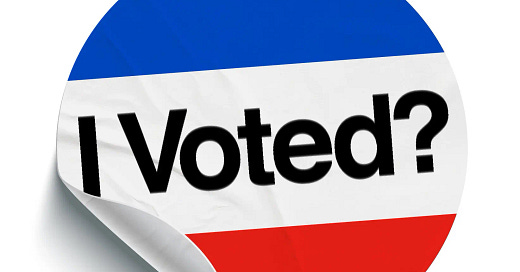HAPPY FRIDAY and welcome to the second SIGNED BOOK GIVEAWAY of this fall’s literary parent status symbol How to Raise A Citizen (And Why it’s Up to You to Do It).
Send me a message or drop me a note letting me know you’ve sent Civic EQ to a parent or caregiver and I’ll mail you a signed copy!
Down to Business
Just like summer, this post I wrote in March on Super Tuesday already feels like a distant memory, but with National Convention Season now behind us, it’s worth revisiting to tie it all together.
In a presidential election year like this one, primary elections start in January and by July/August, the party nominee is established and national conventions (the RNC and DNC) formalize each party’s candidate, lay out the party platform and define the party’s objectives.
And now we are OFFICIALLY in election season!
I asked Lindsey Cormack if I could repost this video she did yesterday on why her book How to Raise A Citizen is actually a timely read. If you’re like me, I generally understand that parenting is a marathon but there’s also a schedule that we’re all on, for no reason other than kids grow up fast and it doesn’t serve anyone for me to punt things like figuring out big toddler emotions to when he’s 10, because at that point, the ship will have sailed for everyone. But sometimes things like instilling civic curiosity tend to feel more time-agnostic, even for a civics junkie like me, so I can only imagine how it must be to be a normal parent who doesn’t wake up thinking about how to write about civics in a fun way.
We only get four or five elections with our kids before they become voting eligible adults themselves. We have to use this time wisely. If you are confused about how politics is happening right now or feel frustrated by our systems, I just wrote a book on how we can make our politics better for our kids…but we have to do some things now as parents to make sure that this happens. - Lindsey Cormack
The Electoral College, and why it’s special
Millennials understand the need to feel special. I didn’t actually realize until I read Lindsey’s chapter on voting that the United States is the only country that uses a system like the Electoral College, making it unique but not without criticism. I’m not here to take a position on the merits, only to help unwind something that Lindsey points out is oftentimes “fuzzy”, even for experienced voters and politicians.
How it works
To understand how the Electoral College works, we have to first remember that Congress is made up of 100 Senators and 435 members of House of Representatives. Every state gets 2 senators, but it’s # of representatives depends on state population. Small states like Vermont might only have 1 representative (and 2 senators) whereas bigger states like California have over 50.
Each state has a different number of electors
In the US, instead of adding up all the individual nationwide votes for a presidential candidate, each state is allocated a certain number of “electors” (votes) based on its congressional representation, meaning each state gets two votes for its two US Senators, and one more additional vote for each member it has in the House of Representatives. For example, this year California has 54 votes (2 senators and 52 members of the House of Representatives). The Census determines the total number of congressional representatives for each state, so the number of state electors can vary between elections. All states get a minimum of 3 electors.
How to win the Electoral College (even if you don’t win the popular vote)
Most states use a winner-takes-all approach, meaning that the candidate who gets the most votes gets all of that state’s electoral votes. But to make things just a little more complicated, in order to win the presidency, a candidate needs at least 270 of the 538 total Electoral College votes to win. This is why it’s possible for a candidate to lose the popular vote but win the election, and vice versa.
If none of this still makes sense or you just really want to keep reading, I love this Today Show article from the last presidential election on explaining the Electoral College to kids.
Have a great weekend,
Sarah







